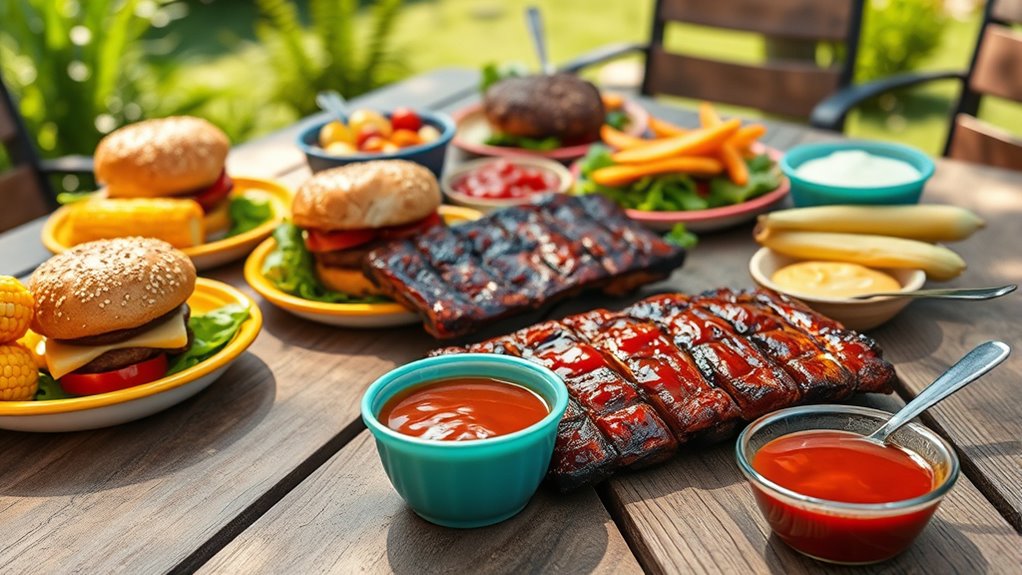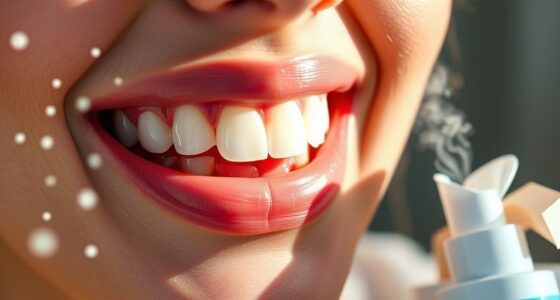During your July BBQ, skip sugary sauces like ketchup and sweet marinades, as they feed bacteria and promote cavities. Avoid acidic condiments such as barbecue sauce and citrus-based dressings, which can erode your enamel over time. Sticky marinades cling to teeth, increasing decay risk, so opt for healthier, tooth-friendly options. For tips on protecting your smile while enjoying summer grilling, keep going—you’ll uncover simple swaps and habits to keep your teeth safe.
Key Takeaways
- Avoid sugary sauces like ketchup and sweet barbecue marinades that feed bacteria and promote cavity formation.
- Skip acidic sauces with vinegar or citrus, as they erode enamel and increase sensitivity.
- Limit sticky marinades that cling to teeth, prolonging sugar and acid exposure.
- Choose natural, low-sugar, and less acidic condiments to protect enamel during summer barbecues.
- Rinse your mouth with water after consuming acidic or sugary sauces to neutralize acids and reduce damage.
The Dangers of Ketchup and Sweetened Sauces

While ketchup and sweetened sauces might enhance your summer barbecue, they can also pose risks to your oral health. Many of these condiments contain artificial flavoring that can mask excessive sweetness, making it easy to consume more than intended. They often include sweeteners and preservatives designed to extend shelf life, but these additives feed oral bacteria, leading to acid production that erodes tooth enamel. The high sugar content from sweeteners accelerates cavity formation and increases the risk of tooth decay. Even if you’re savoring the flavor, remember that frequent exposure to these ingredients can contribute to long-term dental issues. Choosing sauces with natural ingredients and limiting your consumption can help protect your smile while still enjoying your barbecue favorites. Being aware of ourmindandbody.com resources on oral health can provide additional tips for maintaining a healthy smile.
Why Barbecue Sauce Might Be Harmful to Your Teeth

Barbecue sauce often has a high sugar content, which can feed harmful bacteria and increase your risk of cavities. Its acidic ingredients can also wear down tooth enamel over time. Understanding these effects helps you enjoy your summer cookouts without risking your oral health. Additionally, the acidity in barbecue sauce can contribute to enamel erosion, further compromising dental health.
High Sugar Content Risks
Have you ever noticed how sticky and sweet barbecue sauce can be? That natural sweetness often comes from high amounts of added sugar, which can harm your teeth. When you consume foods loaded with sugar, bacteria in your mouth feed on it and produce acids that attack your enamel. Over time, this increases your risk of cavities and tooth decay. While some sauces claim to use sugar alternatives, they may still contain enough sugar to cause damage. The key is moderation. If you can, opt for sauces with less sugar or make your own using natural sweeteners like honey or maple syrup. Color accuracy and contrast ratio are crucial factors that affect how vivid and clear your images appear, even in a dark room. Reducing your intake of high-sugar barbecue sauces helps protect your teeth and keeps your smile healthier after your summer cookouts.
Acidic Ingredients Erode
Acidic ingredients in barbecue sauces can be particularly harmful to your teeth because they weaken and erode enamel over time. Many sauces feature flavor profiles that rely on vinegar, citrus, or other acidic components, which enhance taste but can damage your enamel. These ingredients often originate from natural sources like lemon juice or vinegar, adding brightness to the sauce. When you consume these acidic sauces frequently, the enamel’s protective layer wears down, making your teeth more sensitive and prone to decay. It’s important to be mindful of the ingredient origins and their acidity levels. By understanding how these acids affect your teeth, you can enjoy your barbecue without risking long-term damage, especially if you rinse or brush afterward to neutralize the acids. Additionally, choosing low-acid options or balancing your meal with dairy products can help protect your teeth from erosion.
Marinades That Could Contribute to Tooth Decay

Some marinades contain high sugar levels that feed harmful bacteria in your mouth, increasing decay risk. Acidic ingredients like citrus or vinegar can erode enamel over time, making teeth more vulnerable. Additionally, sticky marinades cling to teeth, prolonging exposure to sugars and acids that promote decay. Being aware of best laundry detergents can help you maintain overall hygiene, including oral health.
Sugar Content in Marinades
While marinades can add delicious flavor to your BBQ, many contain high amounts of sugar that can contribute to tooth decay. Fruit-based marinades often seem healthier but can hide significant sugar levels, especially if they use added sugars or syrups. Consuming these frequently can feed bacteria in your mouth, leading to acid production and enamel erosion. To reduce your risk, look for sugar-free alternatives or make your own marinade using herbs, spices, and vinegar instead of sugary ingredients. If you prefer fruit-based options, choose ones with minimal added sugars or make your own using fresh fruit without added sweeteners. Being mindful of the sugar content in marinades helps protect your teeth while still enjoying flavorful grilled foods. Understanding the impact of sugar can further help you make informed choices for your oral health.
Acidic Ingredients Impact
Because many marinades contain citrus juices or vinegar, they can lower the pH level in your mouth, increasing the risk of tooth decay. Acidic ingredients can erode enamel over time, especially with frequent exposure. However, some fermentation benefits, like boosting probiotic content, can enhance flavor naturally without excessive acidity. To minimize damage, consider these points:
- Limit marinade duration to reduce acidity exposure.
- Opt for milder acids like yogurt or citrus with balanced pH for flavor enhancement.
- Rinse your mouth with water after marinating to neutralize acids and protect enamel.
- Incorporating sensory toys or engaging in mindful activities after eating can help reduce the impact of acidity on your oral health.
While these ingredients can improve taste and fermentation benefits, being mindful of their acidity helps safeguard your oral health during summer barbecues.
Sticky Textures Promote Decay
Sticky marinades, often used to add flavor and tenderness to grilled meats, can also increase the risk of tooth decay. Their sticky textures cling to your teeth, providing a perfect environment for oral bacteria to thrive. When bacteria feed on sugars and sticky residues, acid production accelerates, eroding enamel. The longer these residues stay on your teeth, the higher the decay risk. To help you understand, here’s a quick overview:
| Ingredient Type | Effect on Teeth | Bacterial Growth |
|---|---|---|
| Sugary sauces | Feed oral bacteria | Promote acid production |
| Thick marinades | Increase sticky residue | Extend exposure time |
| Acidic components | Weaken enamel | Accelerate decay |
| Proteins & spices | No negative effect | Neutral |
| Rinse after meals | Reduce residue | Limit bacteria |
Additionally, choosing tooth-friendly ingredients can help mitigate some of these risks. Avoid sticky sauces to protect your oral health during BBQ season.
Hidden Sugars in Popular Summer Condiments

Many popular summer condiments hide surprising amounts of added sugars that can impact your oral health. These sugars often come from hidden sources like natural sweeteners or sugar substitutes used to enhance flavor. Being aware of these can help you make smarter choices. For example:
- Ketchup often contains high-fructose corn syrup, a common added sugar.
- Barbecue sauces may include molasses or honey, increasing sugar content.
- Salad dressings sometimes use sugar substitutes or added sweeteners to improve taste.
- Some condiments may also contain hidden sugars, which are not always listed on ingredient labels but can contribute significantly to sugar intake.
Acidic Sauces That Erode Tooth Enamel

Acidic sauces like vinegar-based dressings, lemon juice, and certain hot sauces can gradually wear down your tooth enamel if consumed frequently. These acids break down the minerals in your teeth, leading to erosion over time. When enjoying flavor combinations that include these sauces, be mindful of your intake. To protect your enamel, store acidic sauces properly—away from heat and sunlight to prevent spoilage and acidity changes. Use them sparingly and rinse your mouth with water afterward to neutralize acids. Here’s a quick guide:
| Sauce Type | Storage Tips |
|---|---|
| Vinegar-based dressings | Keep refrigerated; avoid prolonged exposure to heat |
| Lemon juice | Store in a cool, dark place |
| Hot sauces | Seal tightly; refrigerate after opening |
Being aware helps you enjoy flavors without risking your oral health. Additionally, understanding AI’s role in healthcare can inspire advances in dental diagnostics and treatments that benefit oral health.
Healthier, Tooth-Friendly Alternatives for Your Grill

Opting for tooth-friendly options on the grill can make your summer cookouts healthier and less damaging to your enamel. Instead of sugary, acidic sauces, try natural sweeteners like honey or maple syrup to add flavor without harming your teeth. Incorporate crunchy vegetables such as bell peppers, carrots, or zucchini, which help clean teeth and stimulate saliva production. Here are some healthier, tooth-friendly ideas:
- Use natural sweeteners in marinades or glazes to enhance sweetness without acidity.
- Serve crunchy vegetables alongside your grilled meats for added texture and oral benefits.
- Opt for lemon or lime juice sparingly, as they’re less harmful than processed acidic sauces.
These alternatives keep your grill tasty while protecting your oral health.
Frequently Asked Questions
Are There Natural or Organic Sauces That Are Tooth-Friendly?
You’re wondering if there are natural or organic sauces that are tooth-friendly. The good news is, organic options made with natural ingredients often have fewer added sugars and preservatives, making them better for your teeth. Look for sauces labeled as organic or made with simple, natural ingredients like herbs, spices, and vinegar. These choices help reduce acid and sugar exposure, supporting your oral health while still adding flavor to your meals.
How Does Grilling Affect the Sugar Content in Sauces?
Imagine you’re channeling a bit of a 1950s diner vibe. Grilling affects the sugar content in sauces through sugar caramelization, which occurs when heat causes sugars to brown and thicken the sauce, changing its consistency. This process can make the sauce sweeter and more concentrated, increasing its potential to harm your oral health. Keep an eye on grilling times to prevent excessive caramelization and maintain a healthier sauce.
Can Homemade Sauces Be Healthier for Teeth Than Store-Bought?
Homemade sauces can be healthier for your teeth than store-bought options because you control the ingredients. You can choose sugar alternatives to reduce sugar content and opt for preservative-free options, which are gentler on your enamel. Making your own sauce allows you to avoid added preservatives and high sugar levels, helping to protect your oral health. Plus, you can customize flavors without compromising your smile.
What Are Some Non-Sweetening Options for Flavorful BBQS?
Thinking of your BBQ as a flavorful canvas, you can craft vibrant tastes without sugar. Use savory spice blends like cumin, paprika, and garlic to add depth. smoky marinades made from smoked paprika or chipotle peppers give a rich, complex flavor. These options excite your palate while being gentle on your teeth. Skip sugary sauces, and instead, embrace these natural, bold flavors that make your BBQ unforgettable and healthier.
How Often Should I Rinse My Mouth After Eating BBQ Foods?
You should rinse your mouth after eating BBQ foods to maintain good post-meal oral hygiene. Typically, rinsing once or twice a day is sufficient, but after a smoky or saucy meal, you might want to rinse more often to remove residue and reduce plaque buildup. Use water or a fluoride mouthwash, and wait about 30 minutes before brushing to protect your enamel. Consistent mouth rinsing helps keep your teeth healthy.
Conclusion
So, next time you fire up the grill, will you choose healthier sauces that protect your smile? Skipping sugary, acidic condiments can help keep your teeth strong and cavity-free. Why not experiment with fresh herbs, citrus, or yogurt-based dips instead? Your teeth will thank you for making smarter choices. After all, enjoying summer’s flavors shouldn’t come at the expense of your oral health—so, are you ready to make better grilling decisions?









